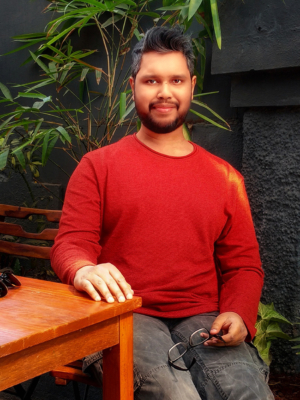An Afternoon of Erasure / An Anthology of Endlessness
[poetry]
An Afternoon of Erasure
I split the pockets of stillness left hovering
on a naked afternoon. Halves drop
like discarded agreements—one half in
the floundering arms of the sea, another
in the blanks of this book I’ve been
pretending to read, if at all.
The afternoon’s gauze. A dry, forgotten sun
fades into the tallows of lush atmosphere.
There are things that are brief, and there
are things that remain, and at times
you wish the damn things would switch
places. A drowning for a spring.
A boat tumbles into the erasures
of the horizon. It wouldn’t matter
if the earth were flat; point is, things tend
to disappear, just the same. It’s twenty
nineteen, and time is a seduction. Starless,
like a child’s diagram of forever.
It’s been eleven years since we kissed,
beneath the bloodiness of a desert moon.
Maybe seduction itself is an erasure.
A night without its iris. A word,
plucked from the withins of a paper
back. Temples, wailing themselves to sleep.
And an afternoon, with a book in
which you were meant to have
written a few things.
An Anthology of Endlessness
The Great Indian Novel isn’t one story.
It is coral and tsunami; it is the margin
And the meteor. Proud river and archival
Brine. Prayer. Faith. Spire. Belief. The Great
Indian Novel is your story and mine, and
Another’s, and another’s, and still, another’s.
It growls at the bludgeoning of the moon
And the floundering amnesias of love. It
Feigns ignorance at letters that have been lost
In the fire, speaking Ghalib from memory,
But forgetting the names of its descendants.
The Great Indian Novel plays Mohammed
Rafi and drinks a few notes of whiskey,
On nights when the past refuses to play to
The script. It remains in that sad, beautiful
Summer of Waheeda Rehman, coaxing the
Sadness away from a Guru Dutt portioned
By shadows and the cinematic mischief of
A halved darkness. The Great Indian Novel
Plucks out Rushdie, Seth, and Khusrau
Off its shelves, blowing away the dust that
Gathers in time, like mementos of storms
Thus past. It reads from Pritam and Ezekiel,
From de Souza and the ghosts scattered
Across the pages of Desai and Chughtai.
The Great Indian Novel is disenfranchised,
Which is simply a chic capitalist word for
Marginalized, as are many of its readers. It is
The song of the monsoon and exhalations
Left behind by love. Desire and blossoms.
Mélange. Memory. Mirth. Spine. The Great
Indian Novel, many years into the dramas
Of a future light, is something they’ll say
That, sitting in the corner table of an Irani
Café, was written by us.
Siddharth Dasgupta is an Indian writer of Poetry and Fiction. He has written three books thus far, scattered across verse, fictional narratives, and that special somewhere in between. His words have appeared in Kyoto Journal, Mekong Review, Poetry at Sangam, Spittoon, Cha, Madras Courier, nether Quarterly, and elsewhere.
Off-and-on, Siddharth also dives into the fragments and textures of travel and culture for a gathering of publications—Travel + Leisure, Harper’s Bazaar, and National Geographic Traveler, included. He lives within the swirling nostalgias of the city of Poona, where he is currently finessing three completed works of literature—a novel and two collections of poetry.
@citizen.bliss | https://citizenbliss.squarespace.com/





